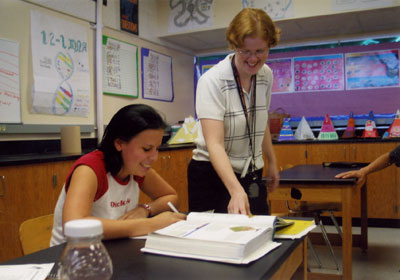All Nonfiction
- Bullying
- Books
- Academic
- Author Interviews
- Celebrity interviews
- College Articles
- College Essays
- Educator of the Year
- Heroes
- Interviews
- Memoir
- Personal Experience
- Sports
- Travel & Culture
All Opinions
- Bullying
- Current Events / Politics
- Discrimination
- Drugs / Alcohol / Smoking
- Entertainment / Celebrities
- Environment
- Love / Relationships
- Movies / Music / TV
- Pop Culture / Trends
- School / College
- Social Issues / Civics
- Spirituality / Religion
- Sports / Hobbies
All Hot Topics
- Bullying
- Community Service
- Environment
- Health
- Letters to the Editor
- Pride & Prejudice
- What Matters
- Back
Summer Guide
- Program Links
- Program Reviews
- Back
College Guide
- College Links
- College Reviews
- College Essays
- College Articles
- Back
Educator of the Year
Most people don’t discover what they love to do until they reach mid-adulthood, sometimes knee deep in an unsatisfying job. But I discovered what I loved to do in Mrs. Stolpa’s sixth grade classroom. Mrs. Stolpa was driven and determined but she ran her classroom in a creative and inspiring way. She had a petite figure and wore her short hair back with a clip. When she read to us, her vibrant capri jeans bounced up and down as she tapped her heels on the ground patiently. She had a collection of colorful pens which she used to scribble words of advice on our drafts of papers and poems, and her classroom walls were painted teal, because she couldn’t stand the catastrophic cream color plastered on them.
I sat one day on the frigid tile floor with my picture-covered composition notebook wide open, staring as Mrs. Stolpa drew a watermelon on a large paper notepad. She used these thick red and green markers that let out an displeasing squeak as they were swiftly stroked across the page. I mimicked her watermelon to the best of my ability in my notebook, as she added seeds to hers on the board. “Do you see the seeds inside this watermelon?” she would say to us, jubilantly. “These are the stories you want to tell, I don’t want to see any watermelon stories!” She then proceeded to explain to us that watermelon stories are big moments like your entire summer break, or even a full day for that matter! But the seed stories, those are the small moments, the specific times that you remember, with tons of detail. From that point on, my stories were small and specific, like seeds. I never wrote a watermelon story again.
Mrs. Stolpa loved to read to us. One story that I remember best was Tuck Everlasting, which she told us was her absolute favorite book. She adored the first paragraph of the book, where the author paints a picture of a scene from the month of August. Again, she pulled out her colorful pens and sketched a big ferris wheel on the board, and read out the first paragraph of Tuck Everlasting with such enthusiasm and intensity that we were all enthralled. “The first week of August hangs at the very top of summer, the top of the live-long year, like the highest seat of a Ferris wheel when it pauses in it's turning…” She paused for a moment after speaking, allowing us to soak up the metaphor and descriptions we just heard. She then proceeded to explain to us that we need to have descriptive writing and produce an image in our reader’s mind.
In Mrs. Stolpa’s class I wrote literary analysis essays, creative pieces, poems and, of course, plenty of “seed” stories. I would sit at a half moon table across from her while she scoured my work, my legs nervously tapping beneath the desk. Every once in a while she’d scrawl swoopy words on the margin with her plethora of pink pens. But when she finished, she’d look at me with a beaming smile and say, “This is wonderful, Anna.” I had never been complimented on my writing before. Every time Mrs. Stolpa would read my piece she would tell me all the places I could improve, but she would also tell me that I did an amazing job. Her belief in me pushed me to share my writing, and be proud of the things I wrote.
I think what helped me the most in her class was that she believed in me. I had no idea I had more of an aptitude for reading and writing, but she helped me discover that about myself. She also helped me discover that I love to write. I scratch my head at math problems, and struggle through science classes, but when it comes to writing, ideas pop through my head like popcorn. She also taught me there is always room to improve. I would soak up her pink-pen advice and write draft after draft of my stories. Sixth grade wasn’t my most sophisticated writing, but it was definitely the most improved. Sometimes discovering what you love to do, can come from someone who believes in you and inspires you every day to be your best. So, thank you Mrs. Stolpa, for teaching me incredible lessons about writing, and for encouraging me to keep writing throughout high school and into the future!

Similar Articles
JOIN THE DISCUSSION
This article has 0 comments.
